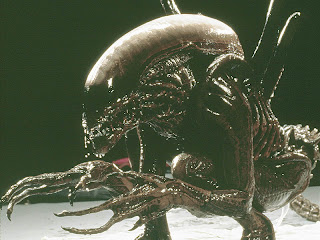 A short while ago I became aware of the Popular Culture Association and discovered they have an extensive horror panel at their annual convention which involves a number of presenters and papers. I contacted the gentleman who coordinates this track and he kindly provided me with a list of the panels from 2003 through 2006. I have begun to contact several of the presenters who have presented paper topics that interest me. I have already received and reviewed some of these papers that will serve as fodder for future blog posts, but one of the first I received touches on an interesting topic with the title “Angels and Aliens: The Supernatural Other in Popular Consciousness.” This was featured as Chapter Six in Carl Royer and Diana Royer, The Spectacle of Isolation in Horror Films: Dark Parades (The Haworth Press, 2005). As the title indicates, the book contrasts how angels and aliens in films have functioned as a representation of “the supernatural other.” Their initial discussion of angels notes how a number of horror films have emphasized the divine destructive aspect of the angelic mission, and also spin tales of ongoing angelic warfare at times with little concern for the existence of the divine at all.
A short while ago I became aware of the Popular Culture Association and discovered they have an extensive horror panel at their annual convention which involves a number of presenters and papers. I contacted the gentleman who coordinates this track and he kindly provided me with a list of the panels from 2003 through 2006. I have begun to contact several of the presenters who have presented paper topics that interest me. I have already received and reviewed some of these papers that will serve as fodder for future blog posts, but one of the first I received touches on an interesting topic with the title “Angels and Aliens: The Supernatural Other in Popular Consciousness.” This was featured as Chapter Six in Carl Royer and Diana Royer, The Spectacle of Isolation in Horror Films: Dark Parades (The Haworth Press, 2005). As the title indicates, the book contrasts how angels and aliens in films have functioned as a representation of “the supernatural other.” Their initial discussion of angels notes how a number of horror films have emphasized the divine destructive aspect of the angelic mission, and also spin tales of ongoing angelic warfare at times with little concern for the existence of the divine at all.
Related to the angelic destroyer and savior is the figure of the alien in horror films. One of the films the authors discuss in this connection is one of my favorite horror films, Ridley Scott’s Alien. The authors make a connection between this alien and the angelic when they state that:
“It is, in a sense, the Angel of Death, the Exterminating Angel, the avenging linchpin in Judeo-Christian mythology, from Genesis to Revelation. Which makes it all the more striking that the film’s thematic elements, such as they are, emphasize embryosis, gestation, and release. In short, creation rather than destruction.”
As the authors continue to develop their description of this film, and the connection between the alien and the angelic they comment:
“Alien, then, can be read as a hybrid of the angel and the alien genres, addressing all the issues taken up by either genre on its own. On the most basic level, there is the issue of bodily autonomy, of whether humans can withstand an invasion or resurrection of the body. For that matter, is there life after death or life beyond earth? Another issue is whether humans are in control of their personal and societal destiny. Is the Other a helper or a destroyer, and how can one be sure? The deepest issue might be whether humans are the chosen ones, the loved ones, either by God or by beings from outer space. Are they worth forgiving, or even saving?”
This connection between the angelic and the alien in horror films is even more interesting when we consider the influence of Christian demonology in shaping the thinking and symbolism in these areas. I have been engaged in an ongoing research project that explores how horror and fantasy in film and television shapes popular conceptions and interpretations of “the occult,” Neo-Paganism, and Witchcraft, and one of the research strands I am pursuing is contemporary Christian demonology. In his concluding comments in a chapter on this topic in The Re-Enchantment of the West, vol. 2 (T & T Clark, 2005), Christopher Partridge states:
“Whether we consider Johann Heinrich Fusseli’s disturbing paining The Nightmare (1782), which depicts an incubus squatting on the stomach of a sleeping woman, or satanic panics, or explicit Satanist beliefs, or Satan films, or malevolent screen aliens such as Ridley Scott’s Alien, or the compositions and activities of black metal musicians and their fans or Icke’s conspiracy theories, modern Western artists, writers, and religionists have drunk deeply from the well of Christian demonology.”
I find it interesting that many Christians e would likely be repulsed by the depictions of the angelic and the alien in horror films, and yet it may be that the representations of these figures reflects prevalent views of the supernatural other and the very demonology espoused by a number of evangelicals and which also circulates as the background knowledge or ethos of a popular viewing audience.





2 Responses to “Angels, Aliens, and the Supernatural Other”